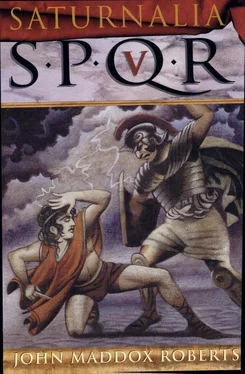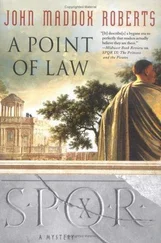John Roberts - Saturnalia
Здесь есть возможность читать онлайн «John Roberts - Saturnalia» весь текст электронной книги совершенно бесплатно (целиком полную версию без сокращений). В некоторых случаях можно слушать аудио, скачать через торрент в формате fb2 и присутствует краткое содержание. Год выпуска: 0101, ISBN: 0101, Издательство: St. Martin, Жанр: Исторический детектив, на английском языке. Описание произведения, (предисловие) а так же отзывы посетителей доступны на портале библиотеки ЛибКат.
- Название:Saturnalia
- Автор:
- Издательство:St. Martin
- Жанр:
- Год:0101
- ISBN:9780312320188
- Рейтинг книги:4 / 5. Голосов: 1
-
Избранное:Добавить в избранное
- Отзывы:
-
Ваша оценка:
- 80
- 1
- 2
- 3
- 4
- 5
Saturnalia: краткое содержание, описание и аннотация
Предлагаем к чтению аннотацию, описание, краткое содержание или предисловие (зависит от того, что написал сам автор книги «Saturnalia»). Если вы не нашли необходимую информацию о книге — напишите в комментариях, мы постараемся отыскать её.
Saturnalia — читать онлайн бесплатно полную книгу (весь текст) целиком
Ниже представлен текст книги, разбитый по страницам. Система сохранения места последней прочитанной страницы, позволяет с удобством читать онлайн бесплатно книгу «Saturnalia», без необходимости каждый раз заново искать на чём Вы остановились. Поставьте закладку, и сможете в любой момент перейти на страницу, на которой закончили чтение.
Интервал:
Закладка:
“I have some excellent Cyprian wine. It produces the mildest of hangovers.”
I stood. “I may take you up on it.” I scanned the walls of the surgery. Asklepiodes had samples of nearly every weapon in the world. Each had attached a scroll describing the wounds it produced. “I wish everyone would use honest weapons like these,” I lamented.
“What a simple place the world would be,” Asklepiodes sighed. “We should then live in a golden age. As it is, the choice of weapons is broad. Even the subtlest poisons are crude compared to the weapon of choice favored in Rome today.”
“Which is?”
“The spoken word. I try to stay aloof from Roman politics, but you are a noisy lot.”
“We learned it from you Greeks,” I pointed out. “Pericles and Demosthenes and all that wordy pack.”
“You should have chosen the Spartans to emulate rather than the Athenians. They were stupid louts, but they had a soldierly appreciation of brevity in oratory. Anyway, I do not refer to your distinguished rhetoricians like Cicero and Hortensius Hortalus. Rather, I speak of the rabble-rousers.”
“Caesar and Clodius?”
“There are many others. I will not presume to address your own realm of expertise, but you would do well to inform yourself of their activities. I fear civil war is in the offing.”
“That’s a bit extreme. We haven’t had one in more than twenty years. A little rioting now and then does no great harm. It clears the air and drains off excess resentments.”
“A most Roman attitude. But this time it will not be aggrieved allies and municipia. It will be class against class.”
“Nothing new about that either. It’s been going on since the Gracchi. Probably earlier. It’s in our nature.”
“I wish you joy of it, then. Please feel free to consult me at any time.”
I thanked him and left. Actually, I was not as sanguine as I pretended with Asklepiodes, but I was reluctant to bare my fears about the Roman social ills with a foreigner, even if he was a friend. And if war between the classes was coming, the rabble-rousers among the commons were by no means solely to blame. My own family shared a good deal of the responsibility.
I was born an aristocrat, but I had few illusions about my peers. We had brought endless ills upon ourselves and upon Rome and its empire through our own stupid intransigence. The extreme end of the aristocratic party resisted any improvement in the lot of the common Roman with the thoughtless, reflexive hostility of a dog guarding its dinner.
I pondered upon these things as I made my way back into the City proper. Rome had long since expanded beyond the walls marked out by Romulus with his plow. The Port of Rome, an extramural riverside district, had leapt the river to form the new suburb of the Transtiber. Huge building projects were in progress out on the Field of Mars, where once the citizens had formed up every year to enroll in their legions and vote upon important matters. They still went there to vote, although few bothered to serve with the legions anymore.
Before long, I thought, there would be more of Rome outside the walls than within. And where was all this excess population coming from? Certainly not from an increasing birth rate. In fact, many old families were dying out from lack of interest. The fertility of the Caecilii Metelli was a distinct exception.
No, Rome was filling up with peasants from the countryside and freed slaves. The peasants, once the backbone of the community, had been forced to sell their lands, bankrupted by huge, inefficient plantations worked by cheap slave labor, another ill my class had visited upon the Republic. And the slaves were themselves the loot of our endless foreign wars. The unfortunates who ended up on the plantations or in the mines were worked to death, but many were used for less arduous service in Rome, and few of them remained slaves for life. Instead, they were manumitted; and within a generation, two at the most, their descendants had full rights of citizenship.
In a street near the cattle market I saw a pompous, self-important senator parading with his troop of clients behind him. Actually, some of them were in front, clearing the way for the great man. There must have been a hundred of them, and that was one reason for the proliferation of slave manumissions. One way to show off your importance was to be seen with a large clientela, and freed slaves automatically became your clients, bound by ties of duty and attendance. Really rich men had thousands. To top it all, I happened to know that that senator (he shall remain nameless; his sensitive descendants are very powerful these days) was himself the grandson of a freed slave.
I wander. I do that a great deal. In my youth I detested all the old bores who were forever lamenting the degeneracy of the times and the low estate to which the Republic had fallen. Now that I am old, I rather enjoy it.
In the cattle market itself I walked among the pens and cages and was very careful where I stepped. The air was redolent of the massed livestock and raucous with their bleats, bellows, cackles, and other noises. Despite its name, the Forum Boarium sold very few cattle except those intended for sacrifice. There was plenty of other animal life, though, from asses to sacrificial doves. You could buy them alive or a piece at a time, already butchered.
Besides the butchers, farmers, and livestock vendors, there were many other sorts of vendors’ stalls. But I was not looking for something to buy. In the Forum, I had noticed that the fortune-tellers’ stalls were gone, undoubtedly driven out by the censors or the aediles. This happened every few years, but they always drifted back. They had to be set up someplace and the cattle market was a good place to look, but I saw none.
Then I saw a man haranguing a goat vendor. The speaker wore a senator’s tunic like mine, but his toga was plain. He held out his hand and the vendor sullenly handed over a number of coins. Collecting fines in the market meant this must be one of the plebeian aediles. The curule aediles wore a toga with a purple stripe.
“Pardon me, Aedile,” I said, walking up behind him.
He turned, his eyes automatically going to the purple stripe on my tunic. “Yes, Senator? How may I …” Then, at the same instant, we recognized one another. “Decius Caecilius! When did you get back?” He stuck out his hand and I took it, managing not to grit my teeth. It was Lucius Calpurnius Bestia, a man I detested.
“Just yesterday. Your rank suits you, Lucius. You’ve lost weight.”
He made a face. “Wretched office. I never have time to eat, and I spend my days crawling all over buildings looking for violations of the construction codes. It keeps me in shape. Ruinously expensive, too, since the sums contributed by the state were laid down about three hundred years ago and prices have gone up since. We have to make up the difference out of our own purses. I can’t tell you how grateful I am that the year’s almost over.” Then he laughed jovially. He really did not understand how much I disliked him. “When will you stand for aedile, Decius?”
“In about five years, if I live that long. That’s when I meet the age qualification.”
“Start borrowing for it now,” he advised. “What brings you to the cattle market? I’d never come here if the job didn’t call for it.”
“I was wondering where the fortune-tellers had got to. They’re not in the Forum, and I don’t see them here either.” I felt a tug at the hem of my toga and looked down. A kid was nibbling on it. I jerked it away from the little beast and determined that no serious damage had been done. The kid looked disappointed and went to join its nanny.
“We ran them out of the City back at the first of the year,” Bestia said. “You know what a passion for order Caesar has. As consul and pontifex maximus he made it our first order of business to drive them outside the gates. They can’t even come into the city to shop without a permit from one of the aediles.”
Читать дальшеИнтервал:
Закладка:
Похожие книги на «Saturnalia»
Представляем Вашему вниманию похожие книги на «Saturnalia» списком для выбора. Мы отобрали схожую по названию и смыслу литературу в надежде предоставить читателям больше вариантов отыскать новые, интересные, ещё непрочитанные произведения.
Обсуждение, отзывы о книге «Saturnalia» и просто собственные мнения читателей. Оставьте ваши комментарии, напишите, что Вы думаете о произведении, его смысле или главных героях. Укажите что конкретно понравилось, а что нет, и почему Вы так считаете.









